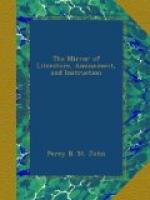His table is of the same finish with his wardrobe. If he sat down to dinner, even when alone, in boots, that visitation which Quin ascribed to the prevalent neglect of “pudding on a Sunday”—an earthquake might be expected to follow. His spoons and silver forks are marked with his crest; and he omits no opportunity to inform his friends, that the right of the family to the arms was proved at Herald’s College by his great uncle John. He has receipts for mulligatawny and oyster soups, not to be equalled; and another for currie-powder, which a friend of his obtained, as the greatest of favours, from Sir Stamford Raffles, and which, though bound in honour not to make known, he means to leave to his son by will, under certain injunctions. His cookery of a “French rabbit,” provided the claret be first-rate, is superb; and on very particular occasions, he condescends to know how to concoct a bowl of punch, especially champagne punch, for the which he has a formula in rhyme, the poetry of which never, as is its happy case, losing sight of correctness and common-sense, comes, as well as its subject matter, home to “his business and his bosom.” His “caviar” is, through the kindness of a commercial friend, imported from the hand of the very Russian cuisinier, who prepares it (unctuous relish!) for the table of the Emperor himself. His cheese is Stilton or Parmesan.
Like “Mrs. Diana Scapes,” he is also “curious in his liquors,” and, in despite of Beau Brummell, patronizes “malt,” as far as to take one glass of excellent “college ale,”—which he gets through his friend Dr. Dusty of All Souls—between pastry and Parmesan. After cheese, he can relish one, and only one, glass of port—all the better if of the “Comet vintage,” or of some vintage ten years anterior to that. His drink, however, is claret, old hock, Madeira, and latterly, since it has become a sort of fashion, old sherry. In these he is a connoisseur not to be sneezed at; and if asked his opinion, makes it a rule never to give it upon the first glass, invariably observing, that “if he would he couldn’t, and if he could he wouldn’t!” He produces anchovy toast as an indispensable in a long evening, after dinner, and to it he recommends a liqueur-glass of cherry-brandy, which he believes is of that incomparable recipe, of which the late King was so fond. If he be a bachelor, he has, in his dining-room, a cellaret, in which repose this, and other similar liquid rarities, and beneath his sideboard stands a machine, for which he paid twelve guineas, for producing ice extempore.




